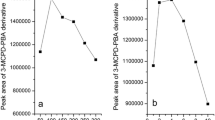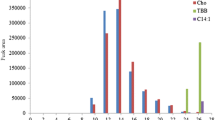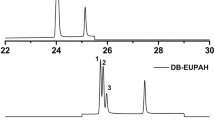Abstract
The presented method for the determination of a number of phthalic acid esters into oily media is based on their extraction by acetonitrile with precipitation under freezing and subsequent solid-phase extraction using alumina. This technique was checked as the best procedure to separate lipophilic phthalates from fatty media achieving elimination of contamination by excess use of solvents. Extracted phthalates are determined in acetonitrile solutions with gas chromatography in conjunction to isotopic dilution mass spectrometry using D4 isotopic labeled derivatives. Full validation of the method was carried out and background effect was examined. Method calibration for extraction from oil resulted in limit of detection (LOD) of 7–10 ng g−1 and limit of quantification (LOQ) of 20–50 ng g−1 for DMP, DEP, DiBP, DBP, DEHP, and BBP and in LOD 500 ng g−1 and LOQ of 1,500 ng g−1 for DiNP and DiDP. Real samples of virgin olive oil from olive press establishments from three different areas were analyzed and the phthalates content was below detection limit for all phthalic esters under consideration for nonindustrial areas and in measurable concentrations for industrial areas specifically with regard to DiBP.


Similar content being viewed by others
References
Anway MD, Skinner MK (2006) Epigenetic transgenerational actions of endocrine disruptors. Endocrinology 147(6):S43–S49, Supplement
BfR (2007) Minutes of the meeting of the working group “Paper and board” on 5 July 2007 at BfR Di-isobutylphthalate in food-contact paper and board. http://www.bfr.bund.de
Biederman-Brem S, Biedermann M, Fiselier K, Grob K (2005) Compositional GC-FID analysis of the additives to PVC, focusing on the gaskets of lids for glass jars. Food Addit Contam Part A 22(12):1274–1284
Calafat AM, McKee RH (2006) Integrating biomonitoring exposure data into the risk assessment process: phthalates [diethyl phthalate and di(2-ethylhexyl) phthalate] as a case study. Environ Health Perspect 114(11):1783–1789
Cavaliere B, Macchione B, Sindona G∗, Tagarelli A (2008) Tandem mass spectrometry in food safety assessment: the determination of phthalates in olive oil. J Chromatogr A 1205:137–143
EU (2011) Commission Regulation (EU) 10/2011) of 14 January 2011 on plastic materials and articles intended to come into contact with food. Off J Eur Union L 12:1–88
ECHA (2009) Data on manufacture, import, export, uses and releases of dibutyl phthalate (DBP) as well as information on potential alternatives to its use. http://www.echa.europa.eu
EFSA (2004) Statement of the scientific panel on food additives, flavourings, processing aids and materials in contact with food (AFC) on the re-classification of some phthalates for consistency with the new SCF guidelines for food contact materials. http://europa.eu.int/comm/food/fs/sc/scf/out82_en.pdf
EFSA (2005a) Opinion of the scientific panel on food additives, flavorings, processing aids and materials in contact with food (AFC) on a request from the Commission related to di-isononylphthalate (DINP) for use in food contact materials. Question no. EFSA-Q-2003-194. EFSA J 244:1–18
EFSA (2005b) Opinion of the scientific panel on food additives, flavorings, processing aids and materials in contact with food (AFC) on a request from the commission related to di-isodecylphthalate (DIDP) for use in food contact materials. Question no. EFSA-Q-2003-195. EFSA J 245:1–2
Fankhauser-Noti A, Grob K (2006) Blank problems in trace analysis of diethylhexyl and dibutyl phthalate: investigation of the sources, tips, and tricks. Eur Food Res Technol 221:416–422
Grob K (2006) Injector-internal thermal desorption from edible oils performed by programmed temperature vaporizing (PTV) injection. J Sep Sci 29:2365–2374
Guo Z, Wang S, Wei D, Wang M, Zhang H, Gai P, Duan J (2010) Development and application of a method for analysis of phthalates in ham sausages by solid-phase extraction and gas chromatography–mass spectrometry. Meat Sci 84:484–490
Jaakola JJK, Knight TL (2008) The role of exposure to phthalates from polyvinyl chloride products in the development of asthma and allergies: a systematic review and meta-analysis. Environ Health Perspect 116(7):845–853
Kato K, Silva MJ, Reidy JA, Hurtz D, Malek NA, Needham LL, Nakazawa H, Barr DB, Calafat AM (2004) Mono(2-ethyl-5-hydroxyhexyl) phthalate and mono-(2-ethyl-5-oxohexyl) phthalate as biomarkers for human exposure assessment to di-(2-ethylhexyl) phthalate. Environ Health Perspect 112(3):327–330
Kato K, Silva MJ, Needham LL, Calafat AM (2005) Determination of total phthalates in urine by isotope-dilution liquid chromatography–tandem mass spectrometry. J Chromatogr B 814:355–360
Lau OW, Wong SK (1996) Determination of plasticizers in food by gas chromatography–mass spectrometry with ion-trap mass detection. J Chromatogr A 737:338–342
Nanni N, Fiselier K, Grob K, Di Pasquale M, Fabrizi L, Aureli P, Coni E (2011) Contamination of vegetable oils marketed in Italy by phthalic acid esters. Food Control 22:209–214
Ostrovský I, Čabala R, Kubinec R, Górová R, Blaško J, Kubincová J, Řimnáčová L, Lorenz W (2011) Determination of phthalate sum in fatty food by gas chromatography. Food Chem 124:392–395
Sánchez-Avila J, Bonet J, Velasco G, Lacorte S (2009) Determination and occurrence of phthalates, alkylphenols, bisphenol A, PBDEs. PCBs and PAHs in an industrial sewage grid discharging to a municipal wastewater treatment plant. Sci Total Environ 407:4157–4167
Sannino A (2010) Development of a gas chromatographic/mass spectrometric method for determination of phthalates in oily foods. J AOAC Int 93(1):315–322
U.S. Consumer Product Safety Commission (2010) Review of exposure data and assessments for select dialkyl ortho-phthalates. Springfield VA 22151
Wittassek M, Koch HM, Angerer J, Br:üning T (2011) Assessing exposure to phthalates—the human biomonitoring approach. Mol Nutr Food Res 55:7–31
Acknowledgments
Thanks are due to Ms Aik Vlachou for helping in the laboratory experiments and to Dr Ch. Alexopoulos for his contribution to the estimation of uncertainties.
Conflict of Interest
Ioannis Ierapetritis declares that he has no conflict of interest. Alexandros Lioupis declares that he has no conflict of interest. Eugenia Lampi declares that she has no conflict of interest. This article does not contain any studies with human or animal subjects.
Author information
Authors and Affiliations
Corresponding author
Rights and permissions
About this article
Cite this article
Ierapetritis, I., Lioupis, A. & Lampi, E. Determination of Phthalates into Vegetable Oils by Isotopic Dilution Gas Chromatography Mass Spectrometry. Food Anal. Methods 7, 1451–1457 (2014). https://doi.org/10.1007/s12161-013-9770-x
Received:
Accepted:
Published:
Issue Date:
DOI: https://doi.org/10.1007/s12161-013-9770-x




